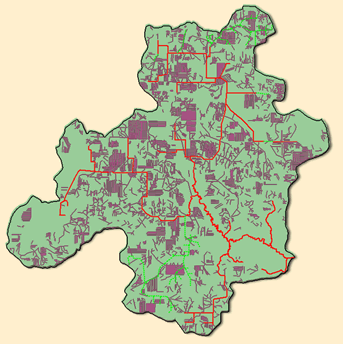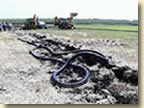
The Engineered System:
More Than 5.3 Million Feet of Tile


- Researchers
estimate that more than 5.3 million feet of tile have been laid in the
Seven Mile Creek Watershed.
- Plastic drainage tile is currently being installed in the watershed every year on private agricultural land (see photos at left). Learn more about drain tiles here.
- Approximately
640 miles of artificial drainage systems have been installed in past
86 years. For
comparison,
- Public drainage ditches = 25 miles
- Public ditch tiles = 15 miles
- Private tile lines = ~ 600 miles
- On the
map above, the purple lines illustrate private drainage tile, the green
are public drainage tile, and the red indicate county drainage ditches
and natural channels.


Despite the fact that artificial drainage systems are integral to Minnesota's agricultural economy, there are growing statewide concerns relating to its impact on the environment.
1) Water
Quality -- Artificial drainage systems can increase the potential for
dissolved nutrients like nitrates to enter groundwater or surface water.
2) Hydraulic Overloading -- Adding more and more artificial drainage can
result in damage to existing drainage systems, possible downstream flooding,
and accelerated streambank erosion. It is estimated that over 50 percent
of the sediment in the Seven Mile Creek watershed is derived from bank
erosion.
3) Habitat Loss -- Decrease in diversity and loss of critical habitat
for waterfowl and other wildlife.
To help address these issues while balancing the need of agricultural
drainage, the BNC Water Quality Board and project partners are working
to help restore wetlands in selected locations. This special project provides
additional incentives for landowners to farm a different crop--a wetland.
The main goal of the project is to intercept agricultural drainage tile
lines with restored wetlands to increase farm incomes, water quality,
flood control and wildlife habitat. Learn more about Wetlands
in Seven Mile Creek Watershed.
Next